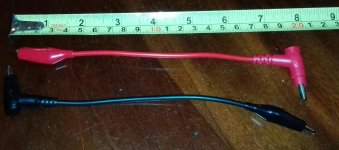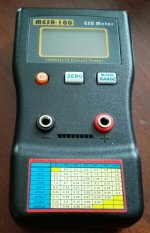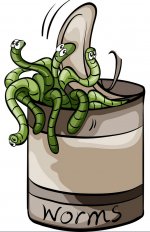With my limited understanding these cables/leads need to be short as possible, (to minimise the resistance created by the lead itself?) but these ones are too short for some parts to be reached with the meter resting on the work surface. I also don't want to HAVE to only use these clips and would like to be able to use normal probes for in circuit testing. (I understand that capacitors are usually best tested out of circuit but the meter literature says this is possible).
Can I make some longer leads with probes on?
If so, what must be done?
Is it just a case of somehow calibrating the new cables to the meter or is there more to it?
What should I do/not do to make this setup usable?
Any advice greatly appreciated.
Can I make some longer leads with probes on?
If so, what must be done?
Is it just a case of somehow calibrating the new cables to the meter or is there more to it?
What should I do/not do to make this setup usable?
Any advice greatly appreciated.
Attachments
I've seen an ESR meter with probes about 50 cm long.
Surely the trick is to compensate for the probe leads, and this procedure will be shown in the user manual?
This normally involves entering the 'probe compensation' menu, shorting the probes together, pressing the 'test' button and waiting for the 'OK'.
Surely the trick is to compensate for the probe leads, and this procedure will be shown in the user manual?
This normally involves entering the 'probe compensation' menu, shorting the probes together, pressing the 'test' button and waiting for the 'OK'.
I've seen an ESR meter with probes about 50 cm long.
Surely the trick is to compensate for the probe leads, and this procedure will be shown in the user manual?
This normally involves entering the 'probe compensation' menu, shorting the probes together, pressing the 'test' button and waiting for the 'OK'.
I see Yes that is the procedure with these little leads according to the instructions I just thought there might something else involved as the leads are ridiculously short. So in theory I can make up some 50cm leads however I see fit and then use the compensation procedure. No mathematical calculations or anything else to get involved with?
Thank you Galu.
Just use good quality, flexible cable intended for test lead construction.No mathematical calculations or anything else to get involved with?
If your test leads are too long, then I suspect the meter will tell you things are not 'OK' when it can't compensate for the test lead resistance.
In that case, shorten the leads by stages till you hit the sweet spot!
Lead compensation is a band-aid that's OK for higher ESR but at 100 milliOhms or less it can be misleading. If there is a way to support a Kelvin connection with 4 probes you will get a much more consistent reading. The lead and the contact resistance at both ends of the lead are not consistent so you can get pretty erroneous readings. The commercial instruments I know of all have Kelvin connections for this reason.
I don't know if that will be possible 1audio as there is only two banana type sockets on the meter I have.
I bought this as I believed it would be easier for me to test capacitors without removing them, I didn't account for the ridiculously short leads or the fat ended clips that are almost impossible to use is tight spaces. So, no problem I thought, I'll just make them longer with probes instead of clips, then I read somewhere that it's not as simple as that................
I bought this as I believed it would be easier for me to test capacitors without removing them, I didn't account for the ridiculously short leads or the fat ended clips that are almost impossible to use is tight spaces. So, no problem I thought, I'll just make them longer with probes instead of clips, then I read somewhere that it's not as simple as that................
Attachments
Last edited:
If accuracy is essential, I guess you would have to upgrade your meter to one like this:
Der EE DE-5000 Unboxing and Teardown - Page 1
Der EE DE-5000 Unboxing and Teardown - Page 1
If accuracy is essential, I guess you would have to upgrade your meter to one like this:
Der EE DE-5000 Unboxing and Teardown - Page 1
How accurate does testing capacitors in a cd player have to be?
I realize I've probably just opened this......
Attachments
Ha! Ha!
Just try lengthening the leads - you've got nothing to lose! 🙂
Ok. Thanks.🙂
That's the thing, make up some three foot cables. Measure a couple caps with your short wires, then remeasure the same caps with the long. HOw different are the readings?
Remember that testing caps while they are in the circuit can give false readings due to parallel stuff in the circuit.
Remember that testing caps while they are in the circuit can give false readings due to parallel stuff in the circuit.
Or, you can add another pair of sockets on the uper end of device - it could became more handy.
connecting them to what in the case? (Sorry if thats a silly question)
- Home
- Design & Build
- Equipment & Tools
- ESR Meter cable/lead length


